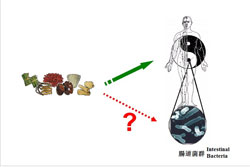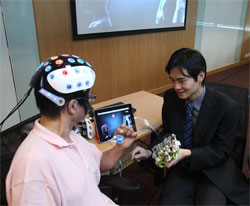Two leading scholars have been invited to deliver public lectures on Biomedical Engineering organized by the Research Grants Council with the Hong Kong Science Museum on 26 April 2014 (Saturday). Details of the lectures are as follows:
| Topic | Speaker | Time |
|---|---|---|
| Gut microflora, human health and Chinese medicines | Prof Wen Luan Wendy Hsiao (Research Professor, Teaching Division, School of Chinese Medicine, Hong Kong Baptist University) | 2:30 pm - 3:30 pm |
| Hand of Hope | Prof Raymond Kai-yu Tong (Professor, Interdisciplinary Division of Biomedical Engineering, The Hong Kong Polytechnic University) | 3:30 pm - 4:30 pm |
Venue: Lecture Hall, Hong Kong Science
Museum (Location
Map)
Language: Cantonese
Free admission on a first-come, first-served
basis.
For enquires, please contact us at 2524
3987 or rgc@ugc.edu.hk.
First Session
Topic: Gut microflora, human health and
Chinese medicines
Speakers: Professor Wen Luan Wendy Hsiao
Time: 26 April 2014 (Saturday) 2:30pm -
3:30pm
|
Brief introduction: Human guts contain over 1 kg of bacteria of more than 1000 species. These good bacteria, or probiotics, play an important role in health and fighting diseases. Recent studies have uncovered that modulation of gut bacteria can have remarkable impacts on metabolic phenotypes, energy balance, disease states and drug responses of individuals. For example, scientists recently showed a marked correlation between body weight loss and the abundance of a specific group of intestinal bacteria. Examples also showed that gut bacterial community could alter the efficiency of the intake of natural products. Professor Hsiao's research team has recently analyzed and compared the impacts of herbal medicines on gut bacteria in healthy and cancerous mice and found that the interaction between the herbs and gut bacteria might help to balance the body to facilitate the transition from diseased state to normal state. In her talk, Professor Hsiao will discuss the dynamic interplay between the host and the gut microbes, and whether gut microbes could dictate individual¡¦s response to drug or Chinese medicine treatment. About the Speaker: Professor Wen Luan Wendy HSIAO, who obtained her Ph.D. Degree from Columbia University in 1985, is an expert in cancer molecular biology, Wnt and MAPK signaling and her recent research focus is on anti-cancer, cancer preventive, anti-inflammatory and anti-hyperlipidemia herbal medicines. She has also taken interest in the intricate interaction between gut microflora and herbal medicines and their effects on health and disease of the host. In addition to her effort in Cancer and TCM research, she also devotes a major fraction of her time in promoting TCM education. |
 |
Second Session
Topic: Hand of Hope
Speaker: Professor Raymond Kai-yu Tong
Time: 26 April 2014 (Saturday) 3:30pm -
4:30pm
|
Brief introduction: The metallic robot hand as shown in the photo has many independent finger joints and looks rather like the robot in the movie "Terminator". Stroke patients can wear this exoskeleton robot hand to regenerate hand function. What makes this robot system remarkable is that it allows the patient full control over his/her finger movements. Electromyography (EMG) electrodes are placed on the patient's forearm and hand. The robot can sense the brain signals sent to the hand muscles and then drive the movement of the robot. With this lightweight portable robot hand, stroke patients can be trained to conduct daily activities. Clinical trials have shown promising results in functional recovery on stroke patients after the robot hand training.
This training device can be used in hospitals, clinics and elderly care centres. About the Speaker: Professor Raymond Kai-yu Tong teaches in the Interdisciplinary Division of Biomedical Engineering at the Hong Kong Polytechnic University and is a recipient of the "2013 Ten Outstanding Young Persons Award". Raymond completed his BEng in Computer Engineering with first-class honours at the University of Hong Kong in 1995 before furthering his studies in the UK and obtaining his PhD in Bioengineering from the University of Strathclyde, Glasgow, in 1998. He joined The Hong Kong Polytechnic University in the following year. He has made great strides in developing a wide range of rehabilitation devices. His innovative work on the rehabilitation robot system "Hand of Hope" was the first Hong Kong invention to have received the Grand Prize in the 40-year history of the International Exhibition of Inventions of Geneva, making Hong Kong internationally visible in this emerging area in healthcare technology. He was also the recipient of the Grand Award of the innovation awards for young members from the Hong Kong Institute of Engineers in 2008. |
 |